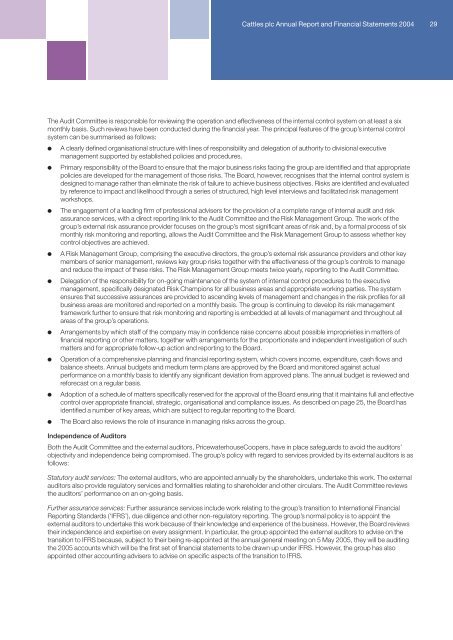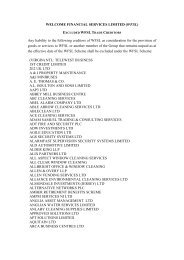Annual report and accounts - Cattles Limited
Annual report and accounts - Cattles Limited
Annual report and accounts - Cattles Limited
Create successful ePaper yourself
Turn your PDF publications into a flip-book with our unique Google optimized e-Paper software.
<strong>Cattles</strong> plc <strong>Annual</strong> Report <strong>and</strong> Financial Statements 2004<br />
29<br />
The Audit Committee is responsible for reviewing the operation <strong>and</strong> effectiveness of the internal control system on at least a six<br />
monthly basis. Such reviews have been conducted during the financial year. The principal features of the group’s internal control<br />
system can be summarised as follows:<br />
●<br />
●<br />
●<br />
●<br />
●<br />
●<br />
●<br />
●<br />
●<br />
A clearly defined organisational structure with lines of responsibility <strong>and</strong> delegation of authority to divisional executive<br />
management supported by established policies <strong>and</strong> procedures.<br />
Primary responsibility of the Board to ensure that the major business risks facing the group are identified <strong>and</strong> that appropriate<br />
policies are developed for the management of those risks. The Board, however, recognises that the internal control system is<br />
designed to manage rather than eliminate the risk of failure to achieve business objectives. Risks are identified <strong>and</strong> evaluated<br />
by reference to impact <strong>and</strong> likelihood through a series of structured, high level interviews <strong>and</strong> facilitated risk management<br />
workshops.<br />
The engagement of a leading firm of professional advisers for the provision of a complete range of internal audit <strong>and</strong> risk<br />
assurance services, with a direct <strong>report</strong>ing link to the Audit Committee <strong>and</strong> the Risk Management Group. The work of the<br />
group’s external risk assurance provider focuses on the group’s most significant areas of risk <strong>and</strong>, by a formal process of six<br />
monthly risk monitoring <strong>and</strong> <strong>report</strong>ing, allows the Audit Committee <strong>and</strong> the Risk Management Group to assess whether key<br />
control objectives are achieved.<br />
A Risk Management Group, comprising the executive directors, the group’s external risk assurance providers <strong>and</strong> other key<br />
members of senior management, reviews key group risks together with the effectiveness of the group’s controls to manage<br />
<strong>and</strong> reduce the impact of these risks. The Risk Management Group meets twice yearly, <strong>report</strong>ing to the Audit Committee.<br />
Delegation of the responsibility for on-going maintenance of the system of internal control procedures to the executive<br />
management, specifically designated Risk Champions for all business areas <strong>and</strong> appropriate working parties. The system<br />
ensures that successive assurances are provided to ascending levels of management <strong>and</strong> changes in the risk profiles for all<br />
business areas are monitored <strong>and</strong> <strong>report</strong>ed on a monthly basis. The group is continuing to develop its risk management<br />
framework further to ensure that risk monitoring <strong>and</strong> <strong>report</strong>ing is embedded at all levels of management <strong>and</strong> throughout all<br />
areas of the group’s operations.<br />
Arrangements by which staff of the company may in confidence raise concerns about possible improprieties in matters of<br />
financial <strong>report</strong>ing or other matters, together with arrangements for the proportionate <strong>and</strong> independent investigation of such<br />
matters <strong>and</strong> for appropriate follow-up action <strong>and</strong> <strong>report</strong>ing to the Board.<br />
Operation of a comprehensive planning <strong>and</strong> financial <strong>report</strong>ing system, which covers income, expenditure, cash flows <strong>and</strong><br />
balance sheets. <strong>Annual</strong> budgets <strong>and</strong> medium term plans are approved by the Board <strong>and</strong> monitored against actual<br />
performance on a monthly basis to identify any significant deviation from approved plans. The annual budget is reviewed <strong>and</strong><br />
reforecast on a regular basis.<br />
Adoption of a schedule of matters specifically reserved for the approval of the Board ensuring that it maintains full <strong>and</strong> effective<br />
control over appropriate financial, strategic, organisational <strong>and</strong> compliance issues. As described on page 25, the Board has<br />
identified a number of key areas, which are subject to regular <strong>report</strong>ing to the Board.<br />
The Board also reviews the role of insurance in managing risks across the group.<br />
Independence of Auditors<br />
Both the Audit Committee <strong>and</strong> the external auditors, PricewaterhouseCoopers, have in place safeguards to avoid the auditors’<br />
objectivity <strong>and</strong> independence being compromised. The group’s policy with regard to services provided by its external auditors is as<br />
follows:<br />
Statutory audit services: The external auditors, who are appointed annually by the shareholders, undertake this work. The external<br />
auditors also provide regulatory services <strong>and</strong> formalities relating to shareholder <strong>and</strong> other circulars. The Audit Committee reviews<br />
the auditors’ performance on an on-going basis.<br />
Further assurance services: Further assurance services include work relating to the group’s transition to International Financial<br />
Reporting St<strong>and</strong>ards (‘IFRS’), due diligence <strong>and</strong> other non-regulatory <strong>report</strong>ing. The group’s normal policy is to appoint the<br />
external auditors to undertake this work because of their knowledge <strong>and</strong> experience of the business. However, the Board reviews<br />
their independence <strong>and</strong> expertise on every assignment. In particular, the group appointed the external auditors to advise on the<br />
transition to IFRS because, subject to their being re-appointed at the annual general meeting on 5 May 2005, they will be auditing<br />
the 2005 <strong>accounts</strong> which will be the first set of financial statements to be drawn up under IFRS. However, the group has also<br />
appointed other accounting advisers to advise on specific aspects of the transition to IFRS.



